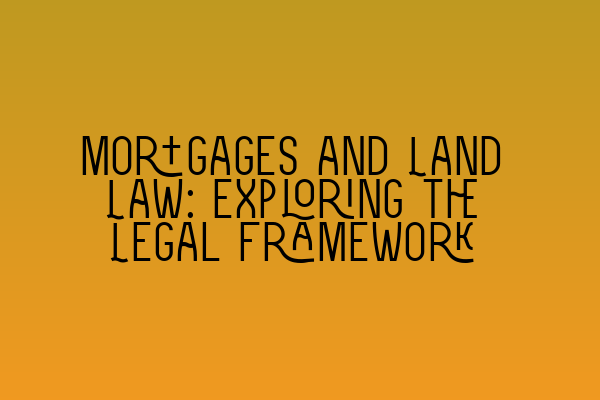Mortgages and Land Law: Exploring the Legal Framework
As a homeowner or aspiring property investor, understanding mortgages and land law is crucial for navigating
the complexities of property transactions. In this article, we will delve into the legal framework surrounding
mortgages and land law, providing you with a comprehensive overview of the topic.
Mortgages: The Basics
A mortgage is a legal agreement between a borrower and a lender, where the borrower uses their property as
collateral to secure a loan. The terms of the mortgage, including the interest rate, repayment period, and
payment structure, are outlined in a mortgage deed.
In the United Kingdom, mortgages are regulated by various statutes, including the Law of Property Act 1925 and
the Land Registration Act 2002. These laws govern the creation, transfer, and discharge of mortgages, ensuring
legal certainty in property transactions.
Mortgagee and Mortgagor
The mortgagee is the lender or the party who provides the loan, while the mortgagor is the borrower or the party
who uses their property as security. The mortgagee has a legal interest in the mortgaged property until the
borrower fulfills their repayment obligations.
Throughout the mortgage term, the borrower (mortgagor) retains possession and control over the property, but
they must adhere to the terms and conditions outlined in the mortgage agreement.
Land Law and Mortgages
Land law encompasses various legal principles that govern the ownership, transfer, and rights associated with
land and property. When it comes to mortgages, land law plays a crucial role in defining and protecting the
interests of both the mortgagee and the mortgagor.
One essential concept in land law is the concept of “equity of redemption.” This principle provides the
mortgagor with the right to redeem their property by repaying the loan in full, plus any accrued interest and
costs. The equity of redemption ensures that even if the borrower defaults on their payments, they have the
opportunity to reclaim their property.
Legal Process for Mortgages
When entering into a mortgage agreement, it is essential to follow the legal process to protect your rights and
interests. The process typically involves the following steps:
- Offer and Acceptance: The borrower applies for a mortgage, and the lender reviews their application,
including creditworthiness and property valuation. - Mortgage Deed: Once approved, the lender provides a mortgage deed outlining the terms of the mortgage.
- Registration: To protect the mortgagee’s interest, the mortgage must be registered with the Land Registry.
This provides notice to third parties of the mortgagee’s legal claim on the property. - Repayment: The borrower makes regular mortgage payments according to the agreed-upon terms until the loan is
fully repaid. - Discharge: Upon full repayment of the mortgage, the borrower obtains a discharge certificate, removing the
lender’s legal interest in the property.
Mortgages and Property Transactions
Mortgages are an integral part of property transactions, allowing individuals and businesses to finance the
purchase of real estate. When buying or selling a property, it is crucial to consider the existing mortgage and
ensure a smooth transfer of legal interest.
If you are considering buying a property, it is essential to conduct thorough due diligence, including checking
the property’s title and any existing mortgages or charges. Engaging the services of a qualified property
solicitor can help you navigate the legal complexities and ensure a seamless transaction.
Conclusion
Mortgages form a significant part of property transactions, and understanding the legal framework surrounding
mortgages and land law is essential for both borrowers and lenders. By familiarizing yourself with the basics of
mortgages, the roles of mortgagee and mortgagor, land law principles, legal processes, and their relevance to
property transactions, you can make informed decisions and protect your interests.
For further preparation and guidance on the SQE exams and other legal topics, we recommend exploring the
following articles:
